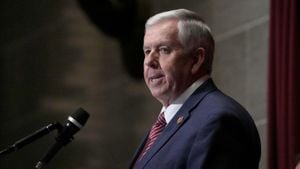Concerns surrounding corruption allegations and infrastructure development have surged to the forefront of public discourse, particularly following the Tripura Cricket Association's (TCA) demand for investigations linked to the installation of floodlights at the Maharaja Bir Bikram (MBB) Stadium. The TCA, represented by officials including President Tapan Lodh and Secretary Subrata Dey, approached the Director General of Police (DGP) Amitabh Ranjan, urging swift action against the individuals implicated in what is being described as a multi-crore corruption scheme.
Allegations of misconduct surfaced back in August 2023, when members of the previous TCA administration were accused of involvement. Complaints led to legal proceedings filed with the Tripura High Court, prompting the formation of a Special Investigation Team (SIT). Secretary Dey expressed frustration during their meeting with the DGP, highlighting the lack of arrests made more than 18 months after the initial allegations. He noted, "Despite the SIT completing its inquiries and submitting a report to the Crime Branch, no action has been taken against those named in the report and the subsequent First Information Report (FIR). The reasons for this delay remain unclear."
This hesitation has pushed the TCA to take additional steps, as members persistently question why those accused have not yet faced legal consequences. Dey commented on the matter, stating, "We were told the investigation is still underway, but the absence of any notable action has raised concerns among club representatives and the public alike."
Alongside the corruption allegations, infrastructure developments are also witnessing scrutiny. Recently, the National Hydroelectric Power Corporation (NHPC) announced plans to conduct studies for renovating the Dumbur hydroelectric project, which suffered significant damage due to flood-related incidents. The plant, situated within the Gomati district, has been closed since September, halting the generation of approximately 5 MW of power.
Tripura State Electricity Corporation Limited's (TSECL) Managing Director, Biswajit Bose, commented on the situation, remarking, "We have requested the NHPC to dispatch an expert team for both renovation and modernization of the Dumbur hydroelectric project. It is anticipated they will arrive shortly to commence the recovery process.” This project has been deemed particularly important, especially in light of rising operational costs associated with gas-based power plants across the region. With current charges reflecting about ₹3.86 per unit for power taken from the Dumbur project against ₹5.90 from gas plants, there exists great potential for cost efficiencies should the project be updated successfully.
The TCA's allegations alongside NHPC's initiative reflect broader themes of transparency and accountability within Tripura’s government and public infrastructure projects. This is not just about sports or energy; it's about fostering a healthy environment for public welfare and confidence among the citizens. The tensions around corruption can seem like they're the undercurrent of various governmental efforts to revitalize the state through infrastructure development.
But this isn’t just happening behind closed doors; it draws public attention and the collective outrage of residents who seek equitable governance. Corruption cases tied to infrastructure projects—be it sports facilities or power generation—cast shadows over their intended benefits and serve as reminders of the work yet to be done to create systems of trust.
On the front lines, advocates within the cricketing community push for not just accountability but the assurance of quality and integrity within all infrastructural undertakings. President Tapan Lodh has already stated, "The terror of corruption is looming large, harming the potential of both the sports community and socio-economic growth within the region. This isn't just about floodlights; it's about the future of infrastructure allocated for sports, youth, and community development.”
Perceptions surrounding public construction spending and management have been complex, often blending cynicism with hope for reform. The immediate steps taken by agencies like the TCA and NHPC highlight momentum toward clearer accountability mechanisms and restoration of lost public trust. Residents are eager to see statements turn to action, leaders from various fields expressing the shared demand for transparency, particularly when funds are involved.
Political leaders are also keeping their ears to the ground, cognizant of how these developments may influence local governance and potentially shape upcoming elections. With every call for accountability, chances for effective change linger on the horizon—transforming issues of corruption and integrity within infrastructure projects from just hot topics of conversation to pivotal elements for success.
The clashes between hopeful infrastructure progress and allegations of corruption represent the need for synergy: where improving facilities can yield tremendous benefits for the public, and where accountability and transparency safeguard these advancements from bureaucratic pitfalls.
Efforts to streamline these calls for investigation and renovation reflect not only the urgent need to tackle corruption but also the passionate commitment of stakeholders across the board—whether it’s sports associations, energy corporations, or civic-minded citizens rallying for moral standards and efficiency within governmental frameworks. These actions serve as the backbone for resilience against corruption, underpinning community aspirations for fair play and effective resource management.
The path forward will require vigilance and proactive management to bridge gaps between public demand, government responsiveness, and the timely implementation of projects such as the renovations of MBB Stadium’s floodlights and the revival of the Dumbur hydroelectric project; lessons learned will need to endure beyond bureaucratic strain, echoing calls for integrity too often left ignored.



